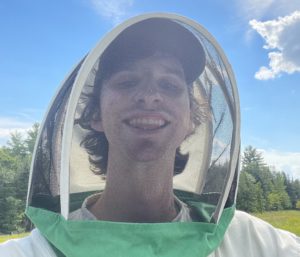 Noah Poitras says he was pleasantly surprised to learn he is the recipient of the 2022 Dr. Kathleen Margaret (Peggy) Heller Memorial Foundation Year Prize, awarded annually to the student with the top mark in the program. He found out about the $1000 award last summer when he received a letter from King’s Advancement Office confirming the good news.
Noah Poitras says he was pleasantly surprised to learn he is the recipient of the 2022 Dr. Kathleen Margaret (Peggy) Heller Memorial Foundation Year Prize, awarded annually to the student with the top mark in the program. He found out about the $1000 award last summer when he received a letter from King’s Advancement Office confirming the good news.
Originally from Gatineau, QC, Poitras is a second-year student in the Contemporary Studies Program, but his post-secondary experience precedes his time at King’s. Previously, he went to Collège d’enseignement général et professionnel, or CEGEP, which are one-to-two-year college programs intended to bridge the gap between high school and university for Quebec students. They offer academic, vocational, or technical experience. Poitras attended Heritage College and received a diploma in General Social Sciences. He credits a large amount of his success with FYP to his experiences at CEGEP.
“I did classes like anthropology and psychology, took some language courses here and there, and they’ve all been very helpful in getting my degree here,” he says. “It really helped me to know some of the broader strokes before coming to FYP.”
Dr. Kathleen Margaret (Peggy) Heller Memorial Foundation Year Prize is named after the late Peggy Heller, a beloved professor at King’s who died in 2011. Her husband, Michael Heller, maintains contact with the award winners to see firsthand the impact his wife’s legacy has on students. Poitras wrote to Heller to introduce himself and thank him. In his letter, Poitras describes some very important influences on his education; not just his time at CEGEP, but his mother, who did FYP herself and advocated strongly for the program. He also highlighted some personal experiences, like his most recent job. Last summer, he worked at an apiary, educating people about bees and beekeeping.
“It’s a great party story,” he says with a laugh. “I can say I’ve been stung on the eye by bees before.”
The impact of this experience on Poitras goes beyond simple flesh wounds. He has internalized the value of his beekeeping and educating work within the context of his academic studies.
“…It’s very much a connection to nature, which I found very interesting and which FYP touches on in section six,” he explains. “But in general, my exposure to something which is ostensibly so natural, to know a lot about the intricacies in which a separate species behaves, has been super interesting.
“You can subject them to study, sure, you can tear apart a bee and look inside and ask what it’s doing, or you can commune with it. And that’s what’s been drawing me back. Even with long hours, sweaty days and bee stings.”
The job, he says, has made him consider a future in education—something he touched upon in his letter to Heller. It would be a fitting path for the recipient of an award created to honour Dr. Heller’s legacy.
Poitras got the opportunity to meet Heller in person earlier this month. On October 19, King’s hosted its first formal meal of the 2022/23 academic year. Faculty, staff, alumni and students gathered in Prince Hall to take part in the time-honoured tradition. At the first formal meal each year, Heller is invited to dine with the winner of his late wife’s prize.
“My late wife, Dr. Peggy Heller, always believed that the great joy of teaching at King’s, was the constant opportunity it afforded her of learning from her students. She loved her students and what they taught her,” he says.
Poitras says it was great to meet Heller in person, and Heller echoed the sentiment.
“In meeting Noah last week, at the King’s formal meal, I experienced the specialness of a King’s student that Peggy so admired. Scholarly, funny and infused with a gentle humility, Noah was the perfect dinner companion. It has been my privilege to meet most of the winners of the Dr. Peggy Heller award over the years. Like Noah, they’ve all reminded me of what a special place King’s continues to be.”
Poitras may be finished with FYP, but he’s happy to share advice on his success with current students. The first thing, he says, is to get started with the essays, due every second Monday, by at least the Thursday before.
“The other thing is to to branch out early…you can get a lot of cultural enrichment from being in a city with [six] universities in about 25 kilometers, you can meet almost infinitely more people than you have time to,” he says. “I had a great time doing [FYP] and I’m very glad it’s what I was able to do in my first year.”

